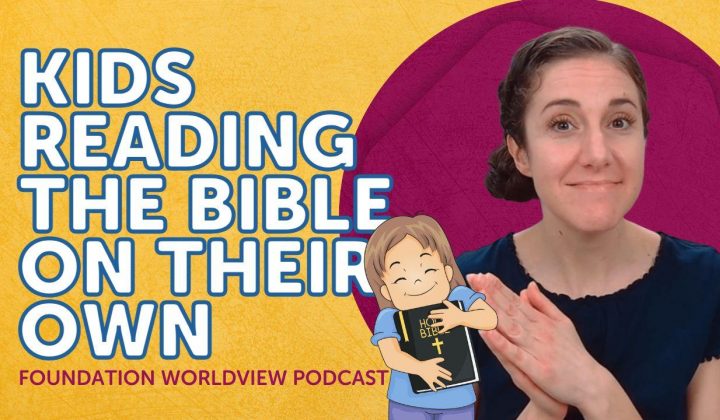Learn more about the journey that led to us equipping kids to carefully evaluate every idea they encounter.
Meet members of our team who have contributed to curriculum development.
Hear from real users of the Foundation Curriculum.
Learn what we believe about God, Jesus, Scripture, and more.
Fostering a Love for Reading in Christian Kids—Here’s Why It Matters
Hello, friends! Today's podcast question is: "How can I foster a love for reading in my children?"
At first glance, this may seem like a question that doesn’t quite fit the Foundation Worldview Podcast. After all, it might not immediately appear to be about helping our kids think critically or biblically. But when we think about it, this question fits perfectly.
Training our children to love reading is deeply important—especially from a biblical worldview—for several reasons.
Why Reading Matters for Christian Kids
1. God Has Revealed Himself Through His Written Word
If we want our children to seek God all the days of their lives, they must be able to read—and more than that, to love reading His Word. Historically, as Christianity has spread across cultures, literacy rates have risen. That’s because Christians are people of the Book.
2. Fulfilling Our Calling Involves Learning
God’s command to “fill the earth and subdue it” requires ongoing learning, and much of that learning comes through reading. Helping our children love to read equips them to fulfill their God-given mandate.
3. Reading Benefits the Whole Person
God, in His common grace, has designed our minds to respond positively to reading. Studies show that reading reduces stress, improves sleep, and sharpens the mind. It even helps prevent cognitive decline.
So, with both spiritual and practical benefits, helping our children love reading is something worth striving for.
We Can’t Force It—But We Can Foster It
We can’t make our children love anything. But we can put steps in place to incline them toward loving reading. Think about it:
-
A child raised in a home where books are rare and no one reads might still grow up to love reading—but it’s less likely.
-
A child surrounded by books, read to regularly, and raised by parents who read is much more likely to develop a love of reading.
Let’s talk about three steps we can take to help foster that love.
Step 1: Model a Love for Reading
Children rarely develop a love for something their parents don’t model.
If you want your child to love reading:
-
Keep books around your home.
-
Let your kids see you reading.
-
Talk about why you value reading.
You don’t have to read for hours each day. Even keeping a book by your bedside can show your children that reading is part of your life.
Step 2: Read With Your Children
You might be thinking, “I already knew this.” And you probably did! But let’s look at a few deeper reasons why reading with your children is so valuable.
With Younger Children:
-
Teaches how to hold and turn pages
-
Builds basic reading habits and book structure
-
Helps them learn to sit and focus
When young kids squirm or jump off the couch mid-book, gently bring them back and finish the story. You’re teaching them that books are meant to be read through.
With Older Children:
-
Keep reading out loud together, even as they grow.
-
Explore different genres.
-
Let them choose some of the books.
-
Use expression and voices to make it engaging.
Growing up, my mom read aloud to me, my brother, and my sister every night. We had special one-on-one reading time before bed, and it created such special memories. We read dozens—if not hundreds—of books together.
If you’ve found a read-aloud your kids loved, share it in the comments! Other parents will benefit from your recommendations.
Step 3: Set Aside Time for Reading Every Day
Life gets busy. Reading can easily get pushed aside.
But remember: reading has spiritual, intellectual, and health benefits. It’s worth intentionally making space for it.
Here are a few ideas from other families:
-
One friend whose kids attend a university-model school (2 days in school, 3 days homeschool) sets aside 1.5 to 2 hours of afternoon quiet time. Part of that time is for reading.
-
Another friend uses a light timer at bedtime. After tucking in the kids, the light lets them read for 20–30 minutes. When the color changes, it’s time to stop.
This not only helps calm their minds—it creates a special reading routine they look forward to.
For Kids Who Struggle With Reading
Not all kids love reading right away. Some need extra help or a different approach.
For Struggling Readers:
Try Playaways—MP3 audiobook devices from your local library. Pair them with the printed book so your child can follow along.
This helps children—especially those reading below grade level—stay engaged with content that’s actually interesting to them.
✨ Tip: Avoid using a phone or tablet for audiobooks unless absolutely necessary. Playaways don’t involve screens, which makes them ideal.
For Kids Who Don’t Enjoy Reading:
-
Visit the library frequently.
-
Explore non-fiction books in areas of interest (like volcanoes, animals, or outer space).
-
Let your child guide what they’re drawn to.
Join the Foundation Worldview Book Club
If you’re not already a member, join our free Book Club! Each month, we send book recommendations for:
-
Ages 4–7
-
Ages 8–12
Along with each book, we include 3–4 worldview discussion questions so you can engage with your child on a deeper level.
In Summary
We can’t force our children to love reading. But we can guide them in that direction through:
-
Modeling a love for reading
-
Reading with our children
-
Setting aside daily time for them to read
My prayer for you is that, no matter what season you're in, you would trust that God is working all things together for your good—using every moment to conform you and the children in your care into the image of His Son.
See you next time!
Related Posts and insights

Building Stamina for Sustained Silent Reading: A Strategy for Enhancing Focus and Comprehension
Learn how to build reading stamina in children for better focus and Scripture comprehension with practical, step-by-step guidance.

Encouraging Kids to Read the Bible
In this episode of the Foundation Worldview Podcast, Elizabeth Urbanowicz explores strategies to help children read the Bible independently, using a structured "I do, We do, You do" approach. She shares insights, resources, and personal stories to inspire a lifelong love for Scripture.

When Should Kids Start Reading the Bible Independently?
At what age should kids begin learning to read the Bible independently? In this episode, Elizabeth Urbanowicz looks at how and when to start kids on their way to read the Bible on their own with practical tips you can use today.



